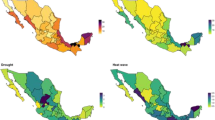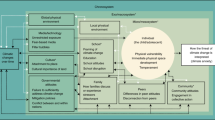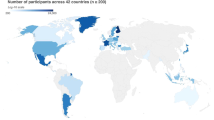Abstract
The COVID-19 pandemic and climate change have been linked to increasing mental health vulnerability globally, with particular concern for heavily impacted regions such as the Caribbean and susceptible groups such as youth. Here we provide an exploratory empirical model of COVID-19 and climate change effects on anxiety levels in youth in three countries of the Caribbean Community. From September 2021 to April 2022, an anonymous cross-sectional survey was distributed online to youths (ages 18–24) in Barbados, Trinidad and Tobago, and Guyana via Facebook advertisements, social media influencers and youth ambassadors. Among a broader survey of health and well-being factors, we measured climate distress/COVID-19 distress, the extent to which thoughts of climate change or the pandemic interfered with their mental health, and generalized anxiety. Using robust bootstrapped mediation models, we investigated the relationship between mental health interference and anxiety, as mediated by distress levels regarding both crises. In a sample of N = 476 youth, we explored three models based on the survey data. First, we established a relationship between climate distress and anxiety levels. Second, COVID-19 mental health interference’s association with anxiety was mediated by COVID-19 distress (0.14 × 0.32 = 0.04, 95% CI: 0.03–0.06, P = 0.001), explaining 29% of the variance. Last, a cross-cutting relationship was observed between COVID-19 and climate change-related mental health, with climate distress mediating relationships between COVID-19 interference and anxiety (0.08 × 0.25 = 0.02, 95% CI: 0.01–0.03, P = 0.001) and the model explaining 28% of the variance. This study supports models that the perceived interference of the pandemic on well-being is associated with generalized anxiety levels and partially explained by specific pandemic-related distress levels. It also provides evidence that climate distress is associated with generalized anxiety. This work leads toward an understanding of pathways to decreased well-being among youth and areas for intervention (for example, coping with distress). This study is among the first to link the climate and COVID-19 crises with empirical data, looking at these as crises rather than specific events. We provide a clear construct of the pathway from crisis to decreased mental wellness that could inform future intervention studies. While our analyses were robust and findings add novelty to the literature, future work is needed to confirm and elucidate the temporality of the associations measured with longitudinal data.
This is a preview of subscription content, access via your institution
Access options
Subscribe to this journal
Receive 12 digital issues and online access to articles
$59.00 per year
only $4.92 per issue
Buy this article
- Purchase on Springer Link
- Instant access to full article PDF
Prices may be subject to local taxes which are calculated during checkout



Similar content being viewed by others
Data availability
Data are available via reasonable request to the corresponding author.
References
Pulwarty, R. S., Nurse, L. A. & Trotz, U. O. Caribbean islands in a changing climate. Environ. Sci. Policy Sustain. Dev. 52, 16–27 (2010).
Thomas, A. & Benjamin, L. Non-economic loss and damage: lessons from displacement in the Caribbean. Clim. Policy 20, 715–728 (2020).
Health and Climate Change: Country Profile 2020: Trinidad and Tobago (World Health Organization & United Nations Framework Convention on Climate Change, 2020); https://iris.who.int/handle/10665/336269
Zuñiga, R. A. A., Lima, G. N. & Villoria, A. M. G. Impact of slow-onset events related to climate change on food security in Latin America and the Caribbean. Curr. Opin. Environ. Sustain. 50, 215–224 (2021).
Chen, J., Zhang, S. X., Yin, A. & Yáñez, J. A. Mental health symptoms during the COVID-19 pandemic in developing countries: a systematic review and meta-analysis. J. Glob. Health 12, 05011 (2022).
Murphy, M. M. et al. COVID-19 containment in the Caribbean: the experience of small island developing states. Res. Glob. https://doi.org/10.1016/j.resglo.2020.100019 (2020).
Sugg, M. M., Runkle, J. D., Hajnos, S. N., Green, S. & Michael, K. D. Understanding the concurrent risk of mental health and dangerous wildfire events in the COVID-19 pandemic. Sci. Total Environ. 806, 150391 (2022).
State of the Climate in Latin America and the Caribbean 2020 (World Meteorological Organization, 2021); https://library.wmo.int/index.php?lvl=notice_display&id=21926#.YtXRK0XMJPZ
Marazziti, D. et al. Climate change, environment pollution, COVID-19 pandemic and mental health. Sci. Total Environ. 773, 145182 (2021).
Zang, S. M., Benjenk, I., Breakey, S., Pusey-Reid, E. & Nicholas, P. K. The intersection of climate change with the era of COVID-19. Public Health Nurs. 38, 321–335 (2021).
Kulcar, V., Siller, H. & Juen, B. Discovering emotional patterns for climate change and for the COVID-19 pandemic in university students. J. Clim. Change Health 6, 100125 (2022).
Lawrance, E. L. et al. Psychological responses, mental health, and sense of agency for the dual challenges of climate change and the COVID-19 pandemic in young people in the UK: an online survey study. Lancet Planet. Health 6, e726–e738 (2022).
Pilgrim, N. A. & Blum, R. W. Adolescent mental and physical health in the English-speaking Caribbean. Rev. Panam. Salud Publica 32, 62–69 (2012).
Charlson, F. et al. Global priorities for climate change and mental health research. Environ. Int. 158, 106984 (2022).
Arvidsdotter, T., Marklund, B., Kylén, S., Taft, C. & Ekman, I. Understanding persons with psychological distress in primary health care. Scand. J. Caring Sci. 30, 687–694 (2016).
Yan, L., Gan, Y., Ding, X., Wu, J. & Duan, H. The relationship between perceived stress and emotional distress during the COVID-19 outbreak: effects of boredom proneness and coping style. J. Anxiety Disord. 77, 102328 (2021).
Alimoradi, Z., Ohayon, M. M., Griffiths, M. D., Lin, C. Y. & Pakpour, A. H. Fear of COVID-19 and its association with mental health-related factors: systematic review and meta-analysis. BJPsych Open 8, e73 (2022).
Keough, M. E., Riccardi, C. J., Timpano, K. R., Mitchell, M. A. & Schmidt, N. B. Anxiety symptomatology: the association with distress tolerance and anxiety sensitivity. Behav. Ther. 41, 567–574 (2010).
Vujanovic, A. A. & Zegel, M. in Emotion in Posttraumatic Stress Disorder: Etiology, Assessment, Neurobiology, and Treatment (eds Tull, M. T. & Kimbrel, N. A.) 343–376 (Elsevier, 2020); https://doi.org/10.1016/B978-0-12-816022-0.00012-0
The Impact of COVID-19 on the Mental Health of Adolescents and Youth (UNICEF, 2020); https://www.unicef.org/lac/en/impact-covid-19-mental-health-adolescents-and-youth
Wang, Y., Kala, M. P. & Jafar, T. H. Factors associated with psychological distress during the coronavirus disease 2019 (COVID-19) pandemic on the predominantly general population: a systematic review and meta-analysis. PLoS ONE 15, e0244630 (2020).
van Nieuwenhuizen, A., Hudson, K., Chen, X. & Hwong, A. R. The effects of climate change on child and adolescent mental health: clinical considerations. Curr. Psychiatry Rep. 23, 88 (2021).
Arora, P. G. & Persaud, S. Suicide among Guyanese youth: barriers to mental health help-seeking and recommendations for suicide prevention. Int. J. Sch. Educ. Psychol. 8, 133–145 (2019).
Brown, C. R. et al. Social determinants of depression and suicidal behaviour in the Caribbean: a systematic review. BMC Public Health 17, 577 (2017).
Liverpool, S., Pereira, B., Pollard, M., Prescod, J. & Trotman, C. Children and young people’s mental health in the English-speaking Caribbean: a scoping review and evidence map. Child Adolesc. Psychiatry Ment. Health 15, 82 (2021).
Kelman, I. et al. A review of mental health and wellbeing under climate change in small island developing states (SIDS). Environ. Res. Lett. 16, 033007 (2021).
Britton, J. C., Lissek, S., Grillon, C., Norcross, M. A. & Pine, D. S. Development of anxiety: the role of threat appraisal and fear learning. Depress. Anxiety 28, 5–17 (2011).
Freeston, M., Tiplady, A., Mawn, L., Bottesi, G. & Thwaites, S. Towards a model of uncertainty distress in the context of Coronavirus (COVID-19). Cogn. Behav. Ther. 13, e31 (2020).
Zinbarg, R. E., Williams, A. L. & Mineka, S. A current learning theory approach to the etiology and course of anxiety and related disorders. Annu. Rev. Clin. Psychol. 18, 233–258 (2022).
Silver, R. C., Holman, E. A. & Garfin, D. R. Coping with cascading collective traumas in the United States. Nat. Human Behav. 5, 4–6 (2021).
Pazderka, H. et al. Collective trauma and mental health in adolescents: a retrospective cohort study of the effects of retraumatization. Front. Psychiatry https://doi.org/10.3389/fpsyt.2021.682041 (2021).
Zhai, P., Zhou, B. & Chen, Y. A review of climate change attribution studies. J. Meteorol. Res. 32, 671–692 (2018).
Chattu, V. K. & Chami, G. Global health diplomacy amid the COVID-19 pandemic: a strategic opportunity for improving health, peace, and well-being in the CARICOM Region—a systematic review. Soc. Sci. 9, 88 (2020).
Daly, M. & Robinson, E. Psychological distress and adaptation to the COVID-19 crisis in the United States. J. Psychiatric Res. 136, 603–609 (2021).
Evans, G. W. Projected behavioral impacts of global climate change. Annu. Rev. Psychol. 70, 449–474 (2019).
Searle, K. & Gow, K. Do concerns about climate change lead to distress? Int. J. Clim. Change Strat. Manag. 24, 362–379 (2010).
Bradley, G. L., Reser, J. P., Glendon, A. I. & Ellul, M. C. in Stress and Anxiety: Applications to Social And Environmental Threats, Psychological Well-Being, Occupational Challenges, and Developmental Psychology (eds Kaniasty, K. et al.) 33–42 (Logos, 2014).
Clayton, S. Climate anxiety: psychological responses to climate change. J. Anxiety Disord. 74, 102263 (2020).
Latkin, C., Dayton, L., Scherkoske, M., Countess, K. & Thrul, J. What predicts climate change activism?: An examination of how depressive symptoms, climate change distress, and social norms are associated with climate change activism. J. Clim. Change Health 8, 100146 (2022).
Lawrance, E. L. et al. Psychological responses, mental health, and sense of agency for the dual challenges of climate change and the COVID-19 pandemic in young people in the UK: an online survey study. Lancet Planet. Health 6, e726-38 (2022).
Albrecht, G. in Climate Change and Human Well-Being (eds Weissbecker, I.) 43–56 (Springer, 2011).
Reser, J. P., Bradley, G. L., Glendon, A. I., Ellul, M. C. & Callaghan, R. Public Risk Perceptions, Understandings and Responses to Climate Change and Natural Disasters in Australia, 2010 and 2011 (National Climate Change Adaptation Research Facility Gold Coast, 2012).
Necho, M., Tsehay, M., Birkie, M., Biset, G. & Tadesse, E. Prevalence of anxiety, depression, and psychological distress among the general population during the COVID-19 pandemic: a systematic review and meta-analysis. Int. J. Soc. Psychiatry 67, 892–906 (2021).
Holingue, C. et al. Mental distress in the United States at the beginning of the COVID-19 pandemic. Am. J. Public Health 110, 1628–1634 (2020).
Zhang, J. et al. The differential psychological distress of populations affected by the COVID-19 pandemic. Brain Behav. Immun. 87, 49–50 (2020).
Duong, D. Reconciliation in health care must go beyond cultural sensitivity. Can. Med. Assoc. J. 193, E256–E257 (2021).
Lathabhavan, R. Fear of COVID-19, psychological distress, well-being and life satisfaction: a comparative study on first and second waves of COVID-19 among college students in India. Curr. Psychol. https://doi.org/10.1007/s12144-022-03207-7 (2022).
Taylor, S. The psychology of pandemics: lessons learned for the future. Can. Psychol. 63, 233–246 (2022).
Tam, K.-P., Leung, A. K.-Y. & Clayton, S. Research on climate change in social psychology publications: a systematic review. Asian J. Soc. Psychol. 24, 117–143 (2021).
Ma, T., Moore, J. & Cleary, A. Climate change impacts on the mental health and wellbeing of young people: a scoping review of risk and protective factors. Soc. Sci. Med. 301, 114888 (2022).
Doherty, T. J. & Clayton, S. The psychological impacts of global climate change. Am. Psychol. 66, 265–276 (2011).
Spitzer, R. L., Kroenke, K., Williams, J. B. W. & Löwe, B. A brief measure for assessing generalized anxiety disorder: the GAD-7. Arch. Intern. Med. 166, 1092–1097 (2006).
Ganadjian, T. T., Monteiro, M., Sanchez, Z. M. & Wagner, G. A. Impacts on anxiety symptoms and alcohol consumption among people with disabilities and family caregivers in Latin America and the Caribbean during the first wave of the COVID-19 pandemic. Public Health https://doi.org/10.1016/j.puhe.2022.06.026 (2022).
Maharaj, R. et al. Somatoform disorders among patients attending walk-in clinics in Trinidad: prevalence and association with depression and anxiety. Ment. Health Fam. Med. 10, 81–88 (2013).
Rich, B. table1: Tables of Descriptive Statistics in HTML v.1.4.2 (2021); https://CRAN.R-project.org/package=table1
R Core Team R: A Language and Environment for Statistical Computing (R Foundation for Statistical Computing, 2022); https://www.R-project.org/
van der Laken, P. Create a Publication-Ready Correlation Matrix, with Significance Levels, in R (2020); https://paulvanderlaken.com/2020/07/28/publication-ready-correlation-matrix-significance-r/
MacKinnon, D. P., Fairchild, A. J. & Fritz, M. S. Mediation analysis. Annu. Rev. Psychol. 58, 593–614 (2007).
Tingley, D., Yamamoto, T., Hirose, K., Keele, L. & Imai, K. mediation: R package for causal mediation analysis. J. Stat. Softw. https://doi.org/10.18637/jss.v059.i05 (2014).
Hebbali, A. olsrr: Tools for Building OLS Regression Models v.0.5.3 (2020); https://CRAN.R-project.org/package=olsrr
Zeileis, A. & Hothorn, T. Diagnostic checking in regression relationships. R News 2, 7–10 (2002).
Alfons, A. robmed: (Robust) Mediation Analysis v.0.11.0 (2022); https://CRAN.R-project.org/package=robmed
Todorov, V. & Filzmoser, P. An object-oriented framework for robust multivariate analysis. J. Stat. Softw. https://doi.org/10.18637/jss.v032.i03 (2009).
Acknowledgements
We thank each of the institutions and individuals who assisted with survey recruitment. We also thank survey participants. Q.S. was funded by the Queen Elizabeth Scholars program. The study was funded by The University of the West Indies Grant Number Campus Research and Publication Fund—CRP.3.MAR21.08.
Author information
Authors and Affiliations
Contributions
Q.S. is the primary author of the manuscript and was responsible for the conceptualization of theories and data analyses. S.B.M. is principal investigator for the study and was involved in conceptualization, planning, data collection and data interpretation. I.G. assisted in conceptualizing the manuscript and theories and interpreting results. E.L. and A.V. conceptualized and guided on project planning and analyses. E.A., N.G., M.C., E.W. and S.A. were the implementation and execution team in Barbados, including data collection and youth ambassador recruitment. P.H. piloted questionnaires to contextualization with youth groups. D.S. and T.S. were the implementation team and execution team in Trinidad and Tobago and consulted on data analyses. E.C. and L.K. were the implementation team and execution team in Guyana.
Corresponding author
Ethics declarations
Competing interests
The authors declare no competing interests.
Peer review
Peer review information
Nature Mental Health thanks Shuquan Chen, Shaun Liverpool and Sarah EO Schwartz for their contribution to the peer review of this work.
Additional information
Publisher’s note Springer Nature remains neutral with regard to jurisdictional claims in published maps and institutional affiliations.
Supplementary information
Supplementary Information
Supplementary Note.
Rights and permissions
Springer Nature or its licensor (e.g. a society or other partner) holds exclusive rights to this article under a publishing agreement with the author(s) or other rightsholder(s); author self-archiving of the accepted manuscript version of this article is solely governed by the terms of such publishing agreement and applicable law.
About this article
Cite this article
Seon, Q., Greaves, N., Campbell, M. et al. Exploratory empirical model of combined effects of COVID-19 and climate change on youth mental health. Nat. Mental Health 2, 218–227 (2024). https://doi.org/10.1038/s44220-023-00197-8
Received:
Accepted:
Published:
Issue Date:
DOI: https://doi.org/10.1038/s44220-023-00197-8



